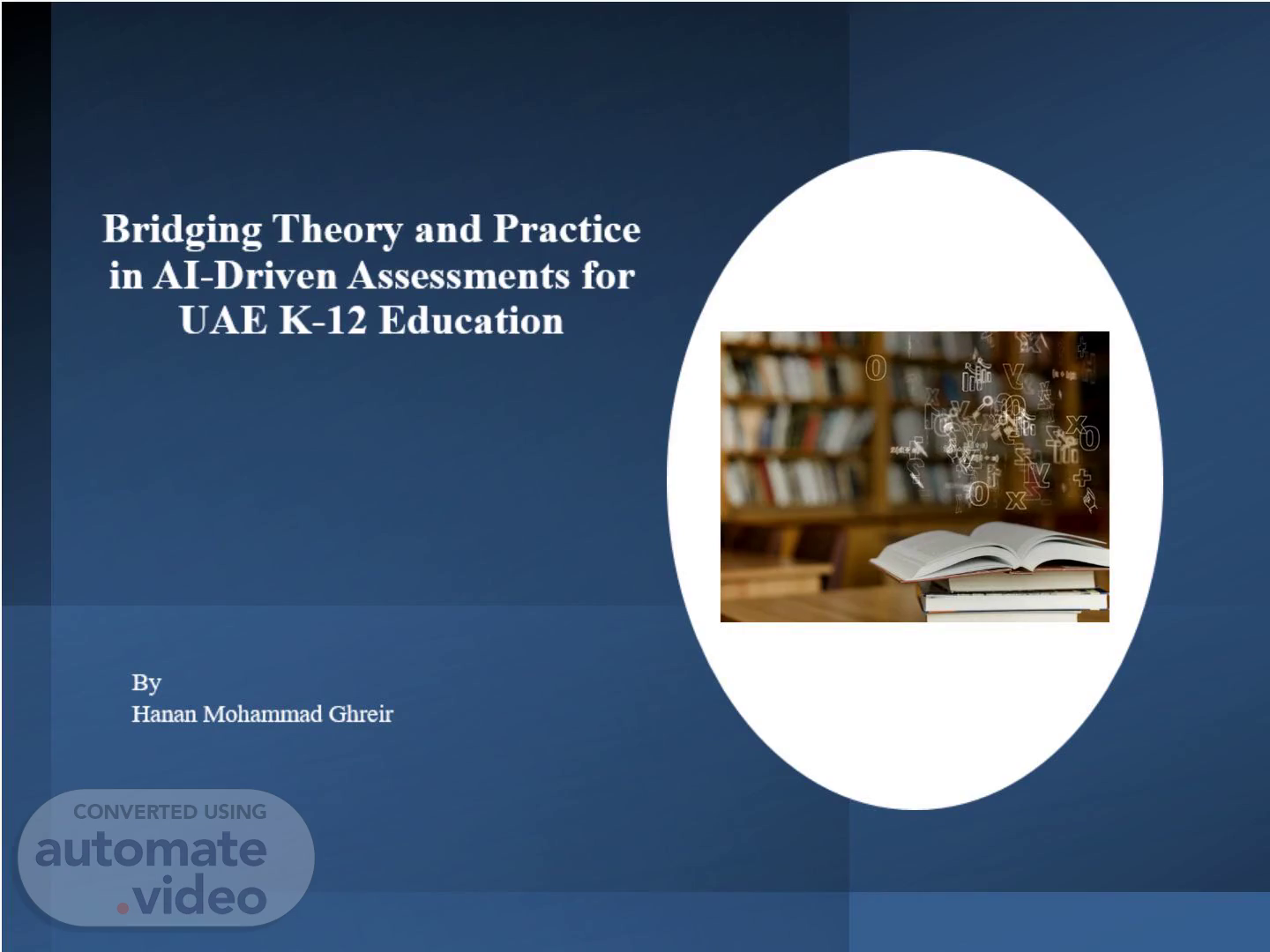
Bridging Theory and Practice in AI-Driven Assessments for UAE K-12 Education
Scene 1 (0s)
Floating Numbers And Letters On Top Of A Book. [Audio] Bridging Theory and Practice in AI-Driven Assessments for UAE K-12 Education By Hanan Mohammad Ghreir.
Scene 2 (10s)
[Audio] Background & Context The UAE is rapidly integrating Artificial Intelligence (AI) into its education system as part of its National AI Strategy 2031. AI is being used to improve teaching, streamline administration, and enhance assessment practices. In particular, AI offers opportunities for personalized learning, data-driven insights, and more efficient evaluations. However, this shift also brings challenges, including concerns over data privacy, algorithmic bias, and limited teacher training. Resistance to change and the complexity of the language further complicate implementation. This study explores how educators in the UAE perceive and use AI in assessments, aiming to bridge the gap between policy ambitions and practical realities in classrooms..
Scene 3 (1m 9s)
[Audio] Intelligence (AI) in educational assessments within the UAE's public sector, with a focus on identifying the opportunities and challenges associated with its implementation. Specifically, the research aims to: 1- Evaluate the impact of AI technologies on the effectiveness, fairness, and accuracy of student assessment. 2- Explore the practical implications of AI adoption for educators, students, and policymakers within the unique cultural and educational context of the UAE. 3- Provide evidence-based recommendations to support the ethical and effective implementation of AI in public education assessment frameworks. Research Objectives.
Scene 4 (1m 55s)
[Audio] Problem Statement Despite the UAE’s strategic push to integrate Artificial Intelligence (AI) into its education system, particularly in assessments, there remains a significant gap between the potential of AI technologies and their practical implementation in classrooms. While AI offers promising solutions for personalized learning and improved evaluation, educators face challenges related to ethical concerns, data privacy, infrastructure limitations, and a lack of professional training. Furthermore, there is limited research on how AI is currently being used in assessment practices within UAE public and private schools..
Scene 5 (2m 40s)
[Audio] Methodology Overview This study employed a mixed-methods design to explore the use of Artificial Intelligence (AI) in educational assessments across K–12 private schools in Abu Dhabi, UAE. Data were collected using a survey adapted from the PAIDEIA framework, combining Likert-scale items to measure AI adoption with open-ended questions to capture teachers’ perceptions, ethical concerns, and institutional support. A pilot study was conducted with 30 teachers to ensure clarity and cultural relevance. The final online survey was distributed through school administrators, resulting in 610 valid responses. Quantitative data were analyzed using SPSS for descriptive statistics, while qualitative responses were examined through thematic analysis to identify common themes and insights. This approach provided a comprehensive view of how educators perceive, adopt, and experience AI in assessment practices..
Scene 6 (3m 48s)
[Audio] 1. AI Usage in Assessments Teachers reported moderate use of AI tools for student evaluation (Mean = 3.70) and data analysis (Mean = 3.64). AI is primarily used for instructional support such as quiz generation, visual aids, and gamified learning activities. ChatGPT was the most commonly mentioned tool, valued for its creative and interactive content generation. 2. Perceptions and Expectations Teachers expressed high optimism about AI’s potential to personalize learning (Mean = 3.89) and improve assessment feedback (Mean = 3.94). Confidence in AI tools increased across grade levels, especially among more experienced educators teaching older students. Findings and Results.
Scene 7 (4m 45s)
[Audio] 3. Ethical and Institutional Challenges Teachers showed concern about ethical issues, including: Data privacy Algorithmic bias Lack of transparency in AI-generated decisions Only a moderate number of teachers were aware of or understood institutional AI guidelines (Means ranged from 3.64 to 3.71), indicating fragmented policy communication. 4. Disparities in Access and Training Teachers reported gaps in infrastructure, unequal access to AI tools, and a lack of professional development. Adoption was limited in high-stakes assessments, reflecting hesitancy to replace human judgment with automation..
Scene 8 (5m 36s)
[Audio] 5. Qualitative Insights Open-ended responses emphasized that AI is seen as “innovative” and “engaging,” but its current use is largely creative rather than analytical. Teachers stressed the importance of maintaining human involvement, particularly in formative assessments and early education.
Scene 9 (5m 56s)
[Audio] Concerns over data privacy, transparency, and bias Lack of infrastructure and uneven access to AI tools Limited training and professional development Teacher hesitation with high-stakes AI decision-making Challenges in Practice.
Scene 10 (6m 16s)
[Audio] Recommendations Establish Ethical Guidelines Create clear policies addressing data privacy, bias, and transparency in AI use. 1 Provide Teacher Training Offer professional development to build educators’ skills in using AI effectively. 2 Enhance Infrastructure Ensure equal access to AI tools across all schools and grade levels. 3 Apply Age-Appropriate Use Use AI more in higher grades, while preserving teacher-led assessment in early years. 4 Promote Collaboration Involve educators, policymakers, and developers in AI planning and implementation. 5 Monitor and Evaluate AI Tools Regularly assess AI's impact to ensure ethical and effective use in classrooms. 6.
Scene 11 (7m 15s)
[Audio] Conclusion This study highlights the UAE’s progress in adopting Artificial Intelligence (AI) in K–12 educational assessments, alongside the challenges that hinder its full potential. While teachers show optimism about AI’s role in personalizing learning and enhancing feedback, actual usage remains moderate and focused on low-stakes tasks. Ethical concerns, infrastructure gaps, and limited training continue to slow down meaningful integration. To bridge the gap between national strategy and classroom practice, it is essential to develop ethical frameworks, invest in teacher development, and ensure equitable access to AI tools. With sustained effort, the UAE can lead in implementing responsible and effective AI-driven assessment practices that enhance educational outcomes while protecting student welfare..
Scene 12 (8m 14s)
[Audio] Thank you. Smiling Face with No Fill. Thank you.